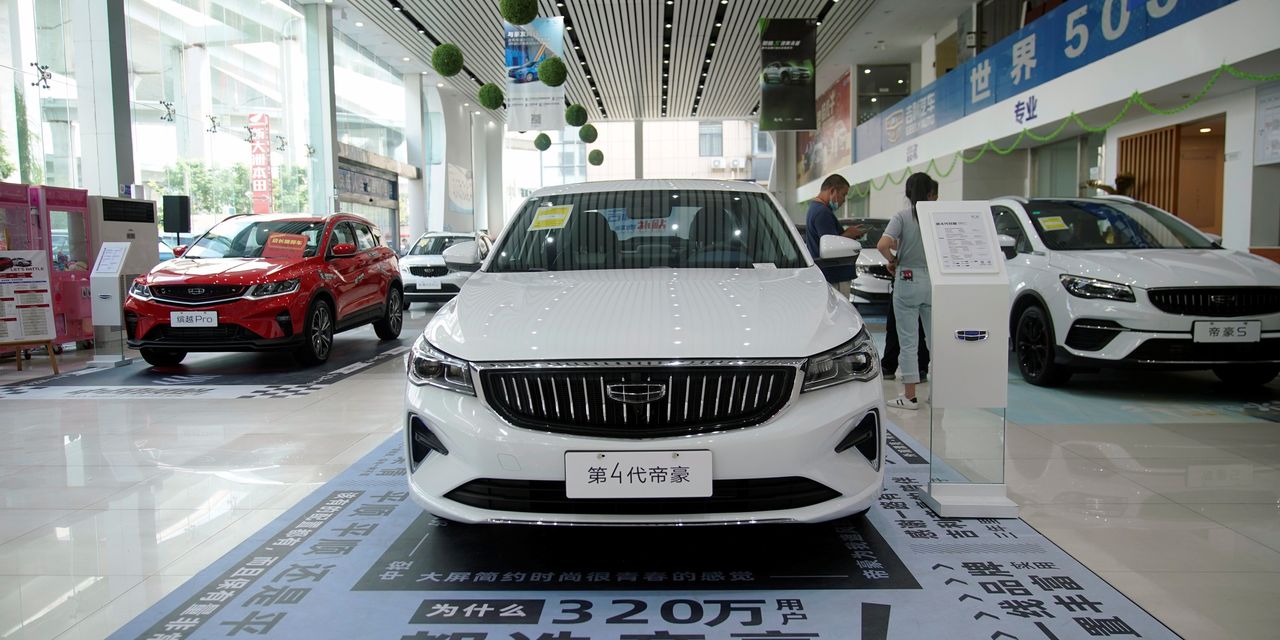

Chinese auto stocks have skidded lower this year, as sluggish sales and supply-chain disruptions have made investors more pessimistic about the world’s largest car market.
The sector has been caught up in the broader volatility roiling Chinese markets, which had fallen sharply in recent sessions before clawing back some of those losses with a big rebound on Wednesday. Meanwhile, the war in Ukraine has boosted prices for metals and oil, triggering concerns that manufacturers’ costs will surge and that demand for gas-guzzling larger vehicles will be dented.
The international car industry faces some similar challenges, and global auto stocks have also fallen in 2022. But the pullback in Chinese shares has been steeper. As of Tuesday, an
index tracking Chinese makers of cars and components had fallen 46% so far this year, compared with a 23% decline in the equivalent world index.
Great Wall Motor Co.
, which is working with Germany’s
, or BMW, to produce electric Mini vehicles in China, has seen its Hong Kong-listed stock fall by more than half this year through Wednesday. Shares in
Geely Automobile Holdings Ltd.
, whose parent company also owns
, have slumped 45%.
The sector’s biggest company by market value is
BYD Co.
, which sold more electric vehicles in China than
Tesla Inc.
last month. As of Wednesday’s close, shares in the Warren Buffett-backed company had lost 26% so far this year.
Investors started the year worried about downbeat consumer sentiment and weakening demand, before Covid-19 outbreaks and lockdowns put fresh stress on supply chains, said Eunice Lee, an analyst at Sanford C. Bernstein.
China’s zero-tolerance approach to controlling the pandemic has created challenges. A Covid-19 outbreak in Suzhou last month forced the shutdown of a factory that supplies semiconductors to car makers including Geely and Great Wall, hurting production and sales at both companies.
Geely said it sold nearly 78,500 cars in February, down 46% from January. It blamed the decline on the chip shortage and the Lunar New Year holiday, the dates of which vary from year to year. Great Wall’s unit sales fell 37% on the same basis.
China’s shortage of auto chips is easing and the country’s supply of cars is rising, a spokesman for the country’s statistics bureau told a press conference Tuesday, according to an official summary posted on the website of the state-owned Securities Times.
More broadly, Chinese economic growth has decelerated and the property market is slumping. In China, that tends to dampen purchases of cars as well as furniture and home appliances, since home buyers often purchase a new car as well.
“If you look at the past 20 years of property-sales and passenger-vehicle-sales growth, they’re basically correlated,” said Angus Chan, an analyst at Bocom International. Investors also worry about whether companies can pass on higher costs without losing some buyers, he added.
Mr. Chan warned that economic weakness and property curbs meant China’s auto industry could be entering a “zero-growth era,” he said, with 0% to 1% annual growth in sales of new passenger cars in 2022 through 2026. New car sales rose 4.4% last year to 20.1 million vehicles, after three years of declines.
The selldown has included EV makers such as
XPeng Inc.,
Li Auto Inc.
and
NIO Inc.,
as well as traditional auto makers.
Photo:
Bloomberg News
Manufacturers of new-energy vehicles started the year with comparatively high valuations and remain relatively richly valued despite big drops in their share prices, said
Ken Wong,
Asia equity portfolio specialist at Eastspring Investments.
As of Wednesday, Li Auto had an enterprise value of 88 times its forecast earnings before interest, tax, depreciation and amortization over the next 12 months, according to FactSet. The equivalent ratio for Geely was 5.3 times.
EVs have been rapidly growing market share in China. Sales of electric and plug-in hybrid cars in February more than doubled to 272,000 vehicles from a year earlier, according to the China Passenger Car Association.
Write to Clarence Leong at clarence.leong@wsj.com
Copyright ©2022 Dow Jones & Company, Inc. All Rights Reserved. 87990cbe856818d5eddac44c7b1cdeb8
24World Media does not take any responsibility of the information you see on this page. The content this page contains is from independent third-party content provider. If you have any concerns regarding the content, please free to write us here: contact@24worldmedia.com

Common Mistakes When Using Athletic Field Tarps

High-Performance Diesel Truck Upgrades You Should Consider

Warehouse Optimization Tips To Improve Performance

Fire Hazards in Daily Life: The Most Common Ignition Sources

Yellowstone’s Wolves: A Debate Over Their Role in the Park’s Ecosystem

Earth Day 2024: A Look at 3 Places Adapting Quickly to Fight Climate Change

Millions of Girls in Africa Will Miss HPV Shots After Merck Production Problem

This Lava Tube in Saudi Arabia Has Been a Human Refuge for 7,000 Years

Four Wild Ways to Save the Koala (That Just Might Work)

National Academy Asks Court to Strip Sackler Name From Endowment

Ways Industrial Copper Helps Energy Production

The Ins and Out of Industrial Conveyor Belts